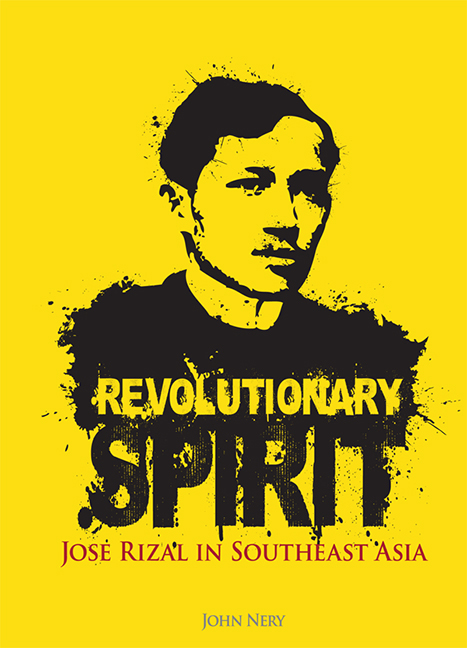Book contents
- Frontmatter
- Dedication
- Epigraph
- Contents
- Foreword
- Message
- Preface
- Acknowledgements
- INTRODUCTION The Uses of Error A Rizal Chronology
- 1 TURNING POINTS
- 2 “THE VERY SOUL OF THIS REBELLION”
- 3 DOCTOR RIZAL
- 4 “HALFBLOED”
- 5 “NO MARX OR LENIN”
- 6 UNDER THE SOUTHERN SUN
- 7 THE HOPE OF MILLIONS IN ASIA
- 8 “HIS NAME IS SWEET IN OUR MEMORY”
- 9 THE MYTH BUSTERS
- 10 “A GREAT HISTORICAL EXPERIMENT”
- Epilogue
- Appendices
- References
- Index
- Frontmatter
- Dedication
- Epigraph
- Contents
- Foreword
- Message
- Preface
- Acknowledgements
- INTRODUCTION The Uses of Error A Rizal Chronology
- 1 TURNING POINTS
- 2 “THE VERY SOUL OF THIS REBELLION”
- 3 DOCTOR RIZAL
- 4 “HALFBLOED”
- 5 “NO MARX OR LENIN”
- 6 UNDER THE SOUTHERN SUN
- 7 THE HOPE OF MILLIONS IN ASIA
- 8 “HIS NAME IS SWEET IN OUR MEMORY”
- 9 THE MYTH BUSTERS
- 10 “A GREAT HISTORICAL EXPERIMENT”
- Epilogue
- Appendices
- References
- Index
Summary
At around the time Sukarno fell from political grace, the trailblazing Malaysian intellectual and one-time politician Syed Hussein Alatas lit on the area of study that would define his reputation. “Around 1966, I became interested in the theme of the lazy native,” he wrote in a 2002 paper.1 “The first question I posed was why were the natives of Indonesia, Malaysia and the Philippines judged as lazy, by hundreds of authors from the ruling colonial regime, in the course of some four centuries …. Such an inquiry had not been carried out before, in the sense of a research question requiring years of effort” (Alatas 2002: 152).
Rizal had carried out a pioneering exploration of the same theme, but limited to the Philippines; it was a reconnaissance mission, so to speak, into the area of study. Alatas’ now-classic work, The Myth of the Lazy Native, reserves an entire chapter for a discussion of Rizal's “On the Indolence of the Filipinos,” which first appeared in 1890. But Alatas’ book was a full-scale assault on the theme, and deployed a disciplined army of arguments. Published in 1977 (after a tortuous path to publication), it has come to define Alatas’ scholarly legacy. The affectionate portrait drawn by his youngest daughter Masturah, the first biography to appear after Alatas’ death in 2007, recognizes the book's pride of place in her father's impressive library of original works. It carries the evocative, expansive title The Life in the Writing: Syed Hussein Alatas: Author of The Myth of the Lazy Native.
Alatas was born in Indonesia in 1928, but moved to Johor Bahru, Malaysia, when he was still a child. He was active in Malaysian opposition politics in 1968–71 (the year he served in the Malaysian Senate). With post-graduate degrees from the University of Amsterdam, he fashioned a sterling academic career, including two decades as the iconic head of Malay Studies at the National University of Singapore. And he was an inveterate writer.
Not even the lowly op-ed escaped his fierce attention. On 12 December 1981, for instance, The Straits Times of Singapore published a commentary of his on the errors of a history textbook. Some of the examples he found demonstrated a continuing interest in the history of Indonesia.
- Type
- Chapter
- Information
- Revolutionary SpiritJose Rizal in Southeast Asia, pp. 190 - 212Publisher: ISEAS–Yusof Ishak InstitutePrint publication year: 2011

